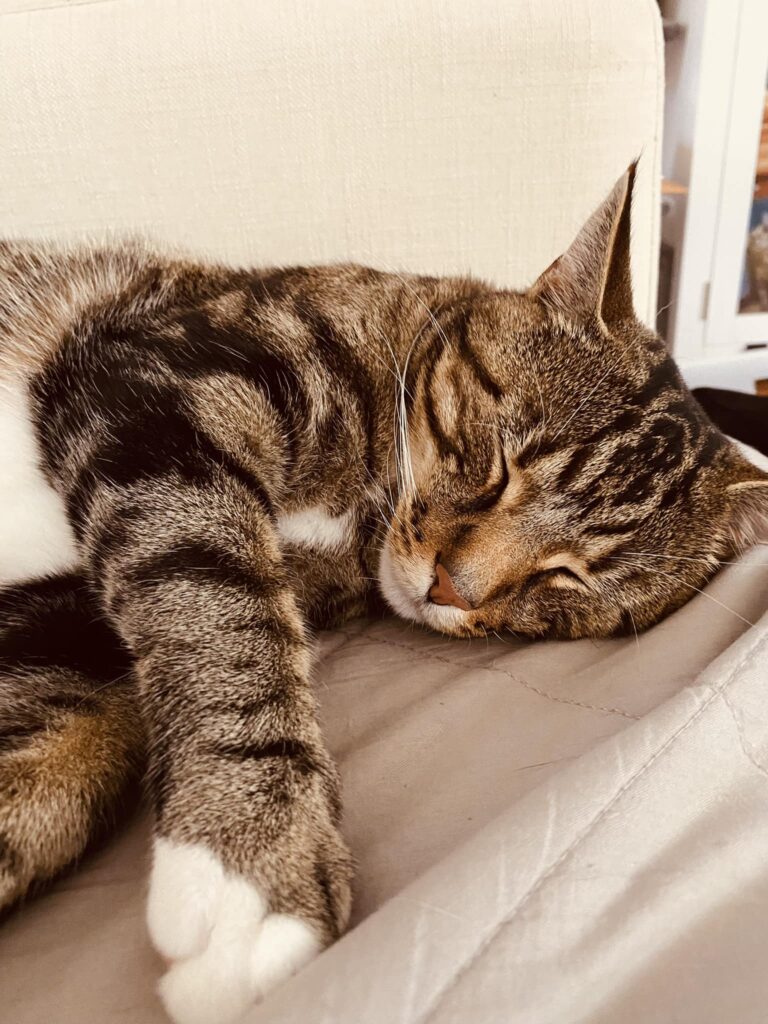By Georgie Waters
Contains discussions about mental health.
Washing hands, checking locks, and having impeccable organisation skills. These traits are what many people associate with obsessive compulsive disorder (OCD). But everyone’s experience is different. Eleven years ago, I was diagnosed with clinical OCD. Through therapy, I’ve begun to understand myself and how to cope. But I knew I was missing something in my life.
There so much stigma around having mental illness, especially OCD. And because of this, it comes with many unexpected challenges. I couldn’t have made it through without receiving all the support from my loved ones, and my amazing cat, Remy.
When I moved into my own place, I was excited, but I couldn’t have anticipated how much I’d miss seeing my family and their dogs every day. It was a struggle to work full time as a pharmacy assistant while battling constant internal worries. Part of the disorder is to immediately complete actions to relieve the stress, until it inevitably returns. For example, I’m just watching TV and I double check that I’ve locked the front door, because my brain tells me that if I don’t, hundreds of poisonous spiders will come through the door. I turn the doorknob three times to make sure it really is locked and then I sit back down. But within 30 seconds, the thought returns, drenching me in fear until I check the door again. And again. And again. It takes so much time away from the things I enjoy doing, like writing and painting.
Like myself, most people who have OCD do know that their behaviours are irrational. It’s just one reason why this disorder so distressing. I know that it causes a great deal of stress for my boyfriend and my family, so I knew that something had to change; I couldn’t keep going on like this.
I spent countless evenings after work researching the benefits of pet ownership and finding overwhelmingly positive results. According to Animal Medicines Australia, “almost 90% of pet owners say their pets have a very positive impact on their lives” and I was so excited about the possibility of this for me.
So, three months ago, I went to the local animal shelter to have a look around. When I arrived, I was immediately drawn to a beautiful tabby cat. When they opened the enclosure, he leaped into my arms and started purring like a motor car!
‘He only came in last night’, the attendant told me. There was no hesitation in my voice when I said I wanted to adopt him.
Because a lot of my obsessions are about cleanliness and worrying about others’ safety, the first couple of weeks with Remy were harder than expected. I’d never lived with a cat before, so his leaping everywhere was quite a shock, and I was constantly worried that he’d hurt himself. Now, I’ve also managed to deal with the exorbitant amounts of cat hair around the house, which initially caused me great anxiety.
I still sometimes struggle with my mental health. But I am so grateful for Remy, who snuggles up to me on my worst days, and always brightens my life with his cheeky antics.
If you or someone you know is struggling with their mental health, you can reach out to the following helplines:
Lifeline: 13 11 14
Beyond Blue: 1300 224 636
SANE Australia: 1800 187 263
Suicide Call Back Service: 1200 659 467
Georgie Waters is a 24-year-old emerging writer who lives with obsessive compulsive disorder. She often writes about her experiences to reduce the stigma associated with mental health issues. While working full time, she also is undertaking a Graduate Certificate in Creative and Professional Writing at Griffith University.
Instagram: georgie.wwriter50
LinkedIn: www.linkedin.com/in/georgie-waters-writer

